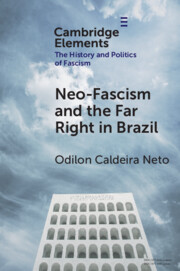Element contents
Neo-Fascism and the Far Right in Brazil
Published online by Cambridge University Press: 15 March 2025
Summary
- Type
- Element
- Information
- Online ISBN: 9781009535472Publisher: Cambridge University PressPrint publication: 20 March 2025

